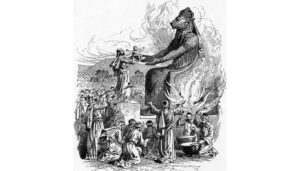“He took the crown off Malkam’s head; it weighed sixty-six pounds, with its gold and precious stones; and it was placed on David’s head. He carried off great quantities of spoil from the city.”-2 Samuel 12:30
There’s something weird going on in verse 30.
After the war victory, we’re told that David took the crown off the King of Rabbah’s head and then placed it on his own.
Now look closely at how heavy we’re told this crown was.
The Complete Jewish Bible says it weighed sixty-six pounds.
The King James version says it weighed one full talent.
In those days, that would’ve been the equivalent of 70 pounds.
Fast forward to the New Testament era, and the weight would’ve been about twice that amount!
Like around 120 pounds.
Whatever number you go by, there’s no way a human could wear a crown that heavy without some serious neck strain.
I mean, I’ve got a kettlebell at home that weighs 50 pounds…
And when I do swings with it…
I gotta pay careful attention to my form…
Or I could end up seriously injuring my back.
Ya feeling me here, homie.
So there’s something not quite right here.
Fortunately, the solution can be found when we look at the following verse from the book of 1st Kings:
“I will do this because they have abandoned me and worshipped ‘Ashtoret the goddess of the Tzidoni, K’mosh the god of Mo’av and Milkom the god of the people of ‘Amon. They haven’t lived according to my ways, so that they could do what was right in my view and obey my regulations and rulings, as did David his father.”-1 Kings 11:33
In 2 Samuel 12:30, the word MALKAM is interpreted as “their king.”
This is one possible reading.
But in the verse from 1st Kings, it’s the name of a deity…
Specifically, the Ammonite god also known as Milkom, Molech, or Ba’al.
In other words, the crown was not on the head of a human king…
But on the head of a large idol!
This would explain its massive weight.
David placing that idol’s crown on his own head was a symbolic act of Yahweh’s triumph over the false god of the Ammonites
This was a common practice in the ancient Near East, where kings would claim victory not only over armies, but over the defeated people’s gods.
This also leads to today’s takeaway.
This wasn’t just a military victory.
It was a spiritual conquest that asserted the supremacy of the God of Israel over the idols of the nations.
At the end of the day, all wars are spiritual battles being played out in the heavens.
CONNECTING THIS TEACHING TO THE NEW TESTAMENT
“For we wrestle not against flesh and blood,
but against principalities, against powers,
against the rulers of the darkness of this world,
against spiritual wickedness in high places.”
– Ephesians 6:12



Leave a Reply